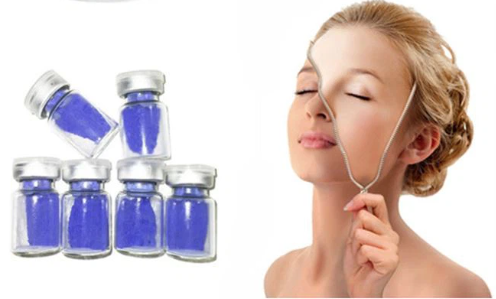
Copper Tripeptide
Copper Tripeptide
During human aging, there is an increase in the activity of inflammatory, cancer-promoting, and tissue destructive genes plus a decrease in the activity of regenerative and reparative genes. The human blood tripeptide GHK possesses many positive effects but declines with age. It improves wound healing and tissue regeneration (skin, hair follicles, stomach, and intestinal linings, and boney tissue), increases collagen and glycosaminoglycans, stimulates the synthesis of decorin, increases angiogenesis, and nerve outgrowth, possesses antioxidant and anti-inflammatory effects, and increases cellular stemness and the secretion of trophic factors by mesenchymal stem cells. Recently, GHK has been found to reset genes of diseased cells from patients with cancer or COPD to a more healthy state. Cancer cells reset their programmed cell death system while COPD patients’ cells shut down destructive tissue genes and stimulate repair and remodeling activities.
Copper peptide GHK-Cu is a naturally occurring copper complex of the tripeptide glycyl-L-histidyl-L-lysine. The tripeptide has a strong affinity for copper(II) and was first isolated from human plasma. The positive effects of GHK-Cu in the body decrease with age; thus, there is an increase in inflammation, harmful activity, and tissue destruction. In plasma, the level of GHK-Cu is about 200 ng/ml at age 20. By the age of 60, the level drops to 80 ng/ml.
GHK was discovered during studies comparing the effect of human plasma from young persons (age 20–25) to plasma from older persons (age 50–70) on the functioning of incubated slices of human hepatic tissue. The younger plasma more effectively induced a profile associated with youth by suppressing fibrinogen synthesis. The active factor was found to be GHK. Since then numerous studies over the course of four decades demonstrated that this simple molecule.
Developing and testing GHK-based products for internal use to support the health of elderly populations and as a complementary therapy in cancer treatment is one possible direction for future research. Based on both biological and gene data, GHK also has the potential to be developed into an anti-anxiety and anti-pain supplemental treatment, and it may be an essential component in a future complex approach to COPD therapy.
Neurodegeneration, the progressive death of neurons, loss of brain function, and cognitive decline is increasing problem for senior populations. Its causes are poorly understood, and therapies are largely ineffective. Neurons with high energy and oxygen requirements are especially vulnerable to detrimental factors, including age-related dysregulation of biochemical pathways caused by altered expression of multiple genes. GHK (glycyl-l-histidyl-l-lysine) is a human copper-binding peptide with biological actions that appear to counter aging-associated diseases and conditions.
Copper Tripeptide on genes important in healthy aging.
Improves wound healing and tissue regeneration (skin, hair follicles, bones, stomach, intestinal linings, and liver)
Increases collagen and glycosaminoglycans
Stimulates the synthesis of decorin
Increases angiogenesis, and nerve outgrowth
Possesses antioxidant and anti-inflammatory effects
Increases cellular stemness and the secretion of trophic factors by mesenchymal stem cells [3–6].
The Suppression of Fibrinogen Synthesis. Fibrinogen is an excellent predictor of mortality especially in patients with cardiovascular complications. GHK was isolated as a plasma factor that suppressed fibrinogen synthesis in liver tissue.
Activation of the Ubiquitin/Proteasome System (UPS). The UPS removes damaged proteins. Higher activities of the UPS appear to retard aging effects.
Activation of DNA Repair Genes. DNA damage is promptly repaired in young and healthy cells, however, as we age, DNA damage starts accumulating. Resetting the activity of DNA repair genes can diminish the deleterious effects of aging.
Antioxidant Genes. Free radicals and toxic end products of lipid peroxidation are linked to atherosclerosis, cancer, cataracts, diabetes, nephropathy, Alzheimer’s disease, and other severe pathological conditions of aging.
Suppression of Insulin and Insulin-Like Genes. The insulin family has been proposed as a negative controller of longevity; higher levels of insulin and insulin-like proteins reduce the lifespan.
Tissue Repair by TGF Superfamily. General tissue repair by the TGF superfamily as exemplified by COPD (chronic obstructive pulmonary disease).
Cancer Controlling Genes. Caspase, growth regulatory, and DNA repair genes are important in cancer suppression.
Protocol: Reconstitute with 6mL bacteriostatic water inject 20 units (0.2mL) SQ daily.
